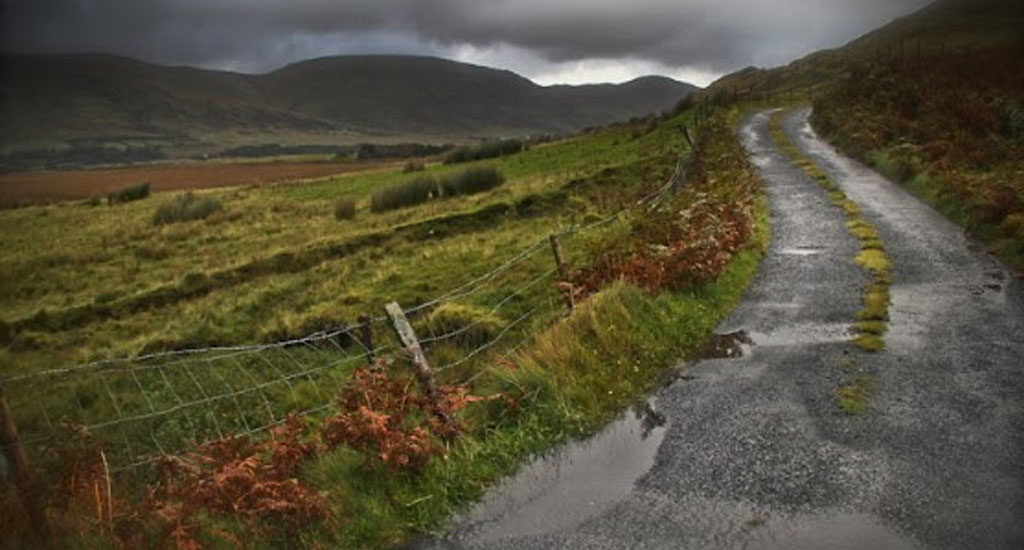Cool and raining across Virginia this morning as the week heads into a whisper of snow. Yes, Monday evening in some parts and a slight — emphasis on the slight — chance of some more elsewhere. Just an inch or so, but nothing dramatic. Obviously, check Wxrisk.com if you prefer an exciting forecast, or your old fashioned weather rock for a more mundane one.
Of course, in the rural parts of Virginia one recognizes this weather. Instead of green, my grass is a dormant yellow against a grey sky — surreal at best, but a reminder that February is here and one last great blast of winter is due. Coffee and wood stoves are the order of the day.
Much of this reminds me of an island I have never been to, but where my father’s family comes from — Ireland. One may not realize this, but Virginia’s motto one upon a time read En Dat Virginia Quartum — Virginia gives the fourth. It was only after the conquest of Ireland after many long years by Cromwell and the Ulster Plantations where the colonials — having been awarded the title “Old Dominon” by Charles II for their steadfast loyalty to the King during the turbulent 17th century — where Virginia revised its colonial seal En Dat Virginia Quintum. Virginia gives the fifth.
Of the five nations that formed Great Britain — England, Wales, Scotland, Ireland, and Virginia — only Virginia and Ireland ever separated themselves from the compact, and Ireland only partially. So parallels between Virginia and Ireland are easy to come by. Both were former English colonies, fought a bloody war of independence, experienced their own diaspora (Virginians to the American West; Ireland to the far corners of the world), and suffered from a lack of internal development. Both claim arcs to foreign royalty — Brian Boru and the Irish kings of antiquity on one side; Pocahontas and the Powhatan by virtue of the Rolfe family on the other.
Indeed, both Ireland and Virginia share a similar total population — roughly 7 million on the whole of Ireland, roughly 8.5 million Virginians. Both have a northeast corner simultaneously inherent and alien to the rest of the country, yet in and of themselves are an economic driver heavily subsidized by their respective national capitals (yes, I just compared Northern Virginia to Ulster).
Yet in other ways, the differences between Virginia and Ireland are stark indeed. Ireland preserves a distinct form of music, literature, the arts, culture, poetry. Virginia has none of these things. One is almost pressured to identify the Virginian equivalent to Seamus Heaney, William Butler Yeats, U2, James Joyce, The Chieftains and so forth. Certainly Ireland has Trinity College and University College in Dublin; Virginia enjoys the University of Virginia and William and Mary among others. Certainly Virginia’s GDP and per capital income far exceeds that of Ireland.
The contrast is simple. In the things that make Ireland unique, Virginia continues to fall prey to the criticism of professional polemicist H.L. Mencken: a veritable Gobi or Lapland whose best and brightest were swallowed by the red gullet of war.
Where are our poets? Where are our plays? Our music? Our innovations and patents? Our towns? If philosophers such as Roger Scruton (still alive, still very English) are indeed correct about the future being more about up/down (or black/green — one to the stars, the other to the earth) as opposed to left/right, where in Virginia are we focusing on ourselves?
Teddy Roosevelt opined on this very topic and its ill-effects on politics over 100 years ago in a speech entitled “The New Nationalism” — and it has great import for us postmoderns trying to get by in Virginia:
These are, of course, big ideas. Once upon a time, even the American farmer was suited for “big ideas” because as Jefferson so famously argued, “because ours are the only farmers who can read Homer.”
…and that would be the author of the Iliad, not the head of the Simpson household.
This is all a very long way of saying that Virginia has historically been a place where people land in order to move further away: Kentucky, Ohio, Texas. Even in colonial times, we never grew down because we sought to grow out.
For lack of growing down, it is always easier to look up — to Richmond, to Washington, to a court, to a corporation — to seek solutions. Yet the hard work of culture really isn’t terribly hard. As a former (Democratic) delegate once counselled, the task is to bloom where you are planted. Make your bed, clean your room, and make the patch of dirt you have the best patch of dirt in Virginia.

